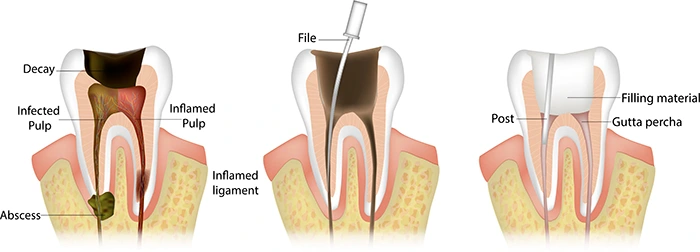Root Canal Recovery Time: What to Expect After the Procedure
Posted on 12/1/2023 by Office at Avery Dental Center |
 When your dentist gives you the news that you need a root canal, it can be a scary prospect. After all, the procedure itself is invasive and many people believe that the procedure and recovery are painful. When your dentist gives you the news that you need a root canal, it can be a scary prospect. After all, the procedure itself is invasive and many people believe that the procedure and recovery are painful.
However, the truth is, thanks to advancements in dental technology and techniques, this procedure and recovery are no more painful than an extraction. The team at Avery Dental Center will work with you to make this process easier. We acknowledge that when you understand the recovery process, your experience will be much smoother. In this article, we'll explore the various stages of recovery.
How Does the Root Canal Procedure Work?
Before we explore the recovery process, it's important to understand how the procedure works. During this treatment, the dentist will remove the infected dental pulp from the tooth, disinfect the canal, and seal it to prevent further infection. While the procedure is designed to eliminate pain and salvage the structure of the natural tooth, it's also important to remember that some discomfort can be expected during recovery.
Immediate Post-Procedure Period
Since the dentist uses local anesthesia during the procedure, it's common to experience some residual numbness following the procedure. Typically, this numbness will last for several hours. If sedation is required, patients may experience grogginess as well. It is critical to rest and avoid chewing on the treated side of the mouth to avoid damaging the temporary filling or crown.
First Few Days: Managing Discomfort
During the first few days, you can expect some minor discomfort. This can typically be managed with OTC pain relievers, but your dentist may give you a prescription pain reliever in case. You can also relieve swelling and alleviate pain by applying a cold compress to the affected area. Your dentist will provide you with specific aftercare instructions to facilitate a smooth recovery.
Tips for Maintaining Oral Hygiene During Recovery
Proper oral hygiene habits are critical for a smooth recovery. However, for the first few days following the procedure, it's important to be cautious when brushing and flossing around the treated tooth. In addition, avoid vigorous rinsing, as it could dislodge the temporary filling or crown. According to dental experts, you should use a soft-bristled toothbrush and an alcohol-free, fluoride mouthwash to facilitate healing.
What Should I Eat Following a Root Canal?
You will want to stick to soft, easy-to-chew foods during the first few days following root canal treatment. Soups, yogurt, smoothies, and mashed potatoes are great options. Avoid hard, crunchy, sticky foods, which could harm the treated tooth.
Signs of Concern: When Should You Contact Your Dentist?
While some discomfort can be expected, certain signs may indicate a problem. If you are experiencing severe pain and/or swelling that does not subside or bleeding/discharge around the treated tooth, it's important to contact the dentist as soon as possible. These are signs of an infection or other complications that require immediate attention.
Follow-up appointments at Avery Dental Center
While it may be nerve-wracking to hear your dentist recommend root canal treatment, it's important to note that it's not as scary as you might think. When you understand what to expect during and after the procedure, you're more likely to have a positive experience.
Regular follow-up appointments are critical to monitor the progress of your recovery. The dental team at Avery Dental Center will assess your condition, remove temporary fillings and crowns, and discuss the next steps such as placing a permanent crown.
Schedule your visit with the team at Avery Dental Center today in Dublin, Oh. Stay on top of your oral health to reduce your risk of needing root canal treatment.
Root Canal Recovery FAQs
If you have questions or concerns about root canal treatment at Avery Dental Center, feel free to bring them up. We acknowledge the importance of understanding your procedures and will work with you to make things easier. Following are a few of the most common questions that we've gotten:
Can I eat 3 days after the root canal?
Yes, you can eat three days after root canal treatment. You will want to stick to soft, easy-to-chew foods for the first few days, transitioning to firmer foods as tolerated. However, it's still important to avoid chewing hard, sticky, or crunchy foods with the treated tooth.
How long is the rest period after a root canal?
The rest period following root canal treatment varies from one patient to another. Experts advise that you take it easy for the first day, resuming normal activities as tolerated.
How do I know if my root canal is healing?
The most common signs of healing include reduced pain and swelling and a gradual return to normal oral function. If you have concerns about the healing process, consult your dentist.
Is ice cream good after a root canal?
Ice cream is cool and soft, which means that consuming it following root canal treatment can be soothing and enjoyable. The coolness can alleviate discomfort and/or swelling in the treated area. |
|